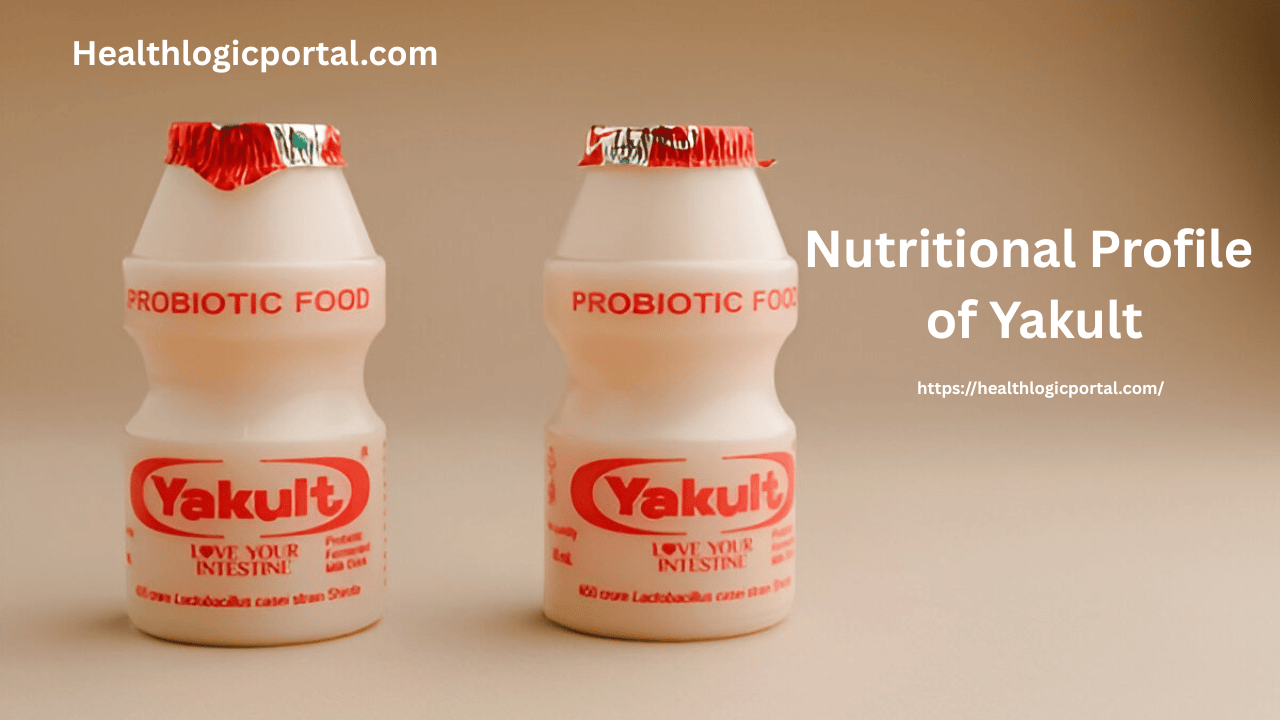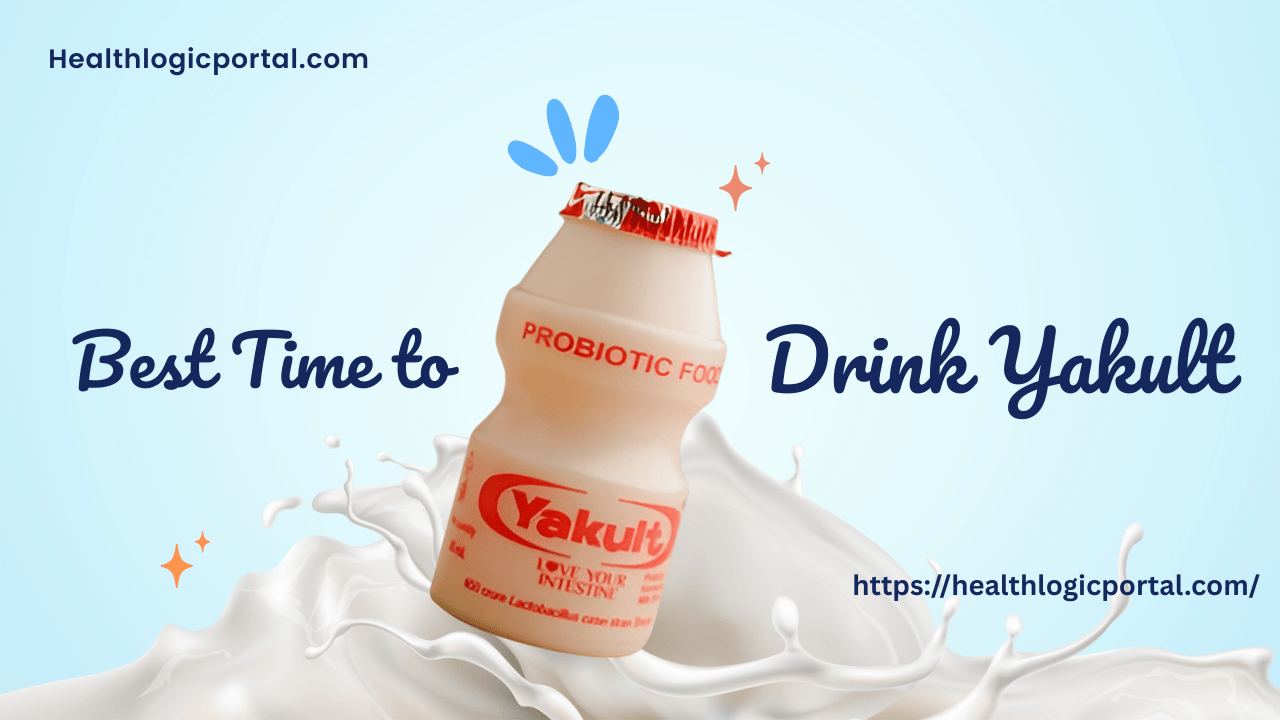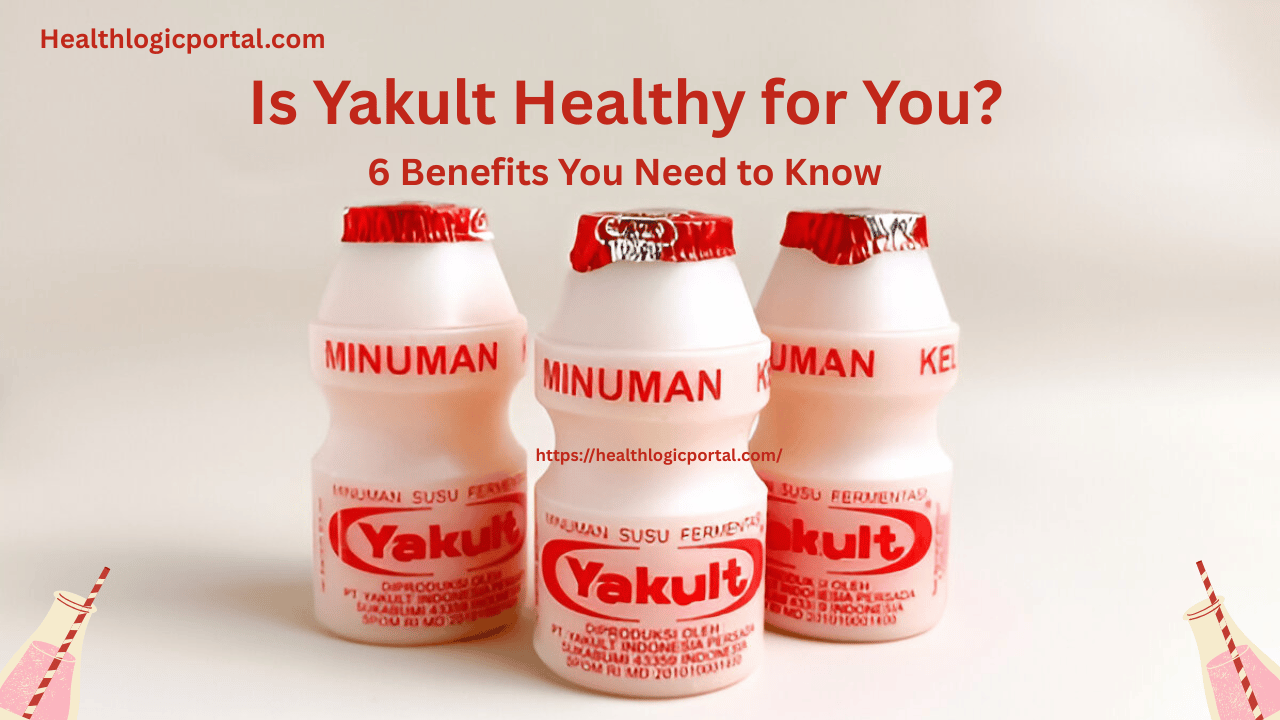This content is contributed by Dr. Maryam Touseef, a qualified Nutritionist and Dietitian specializing in personalized diet and lifestyle guidance.
Yakult has become one of the most popular probiotic drinks in the world, with millions of bottles sold daily across different countries. Do you know? This small fermented milk drink, originally from Japan, is often marketed as a health-boosting product that supports digestion and immunity. But many people still wonder: Is Yakult really healthy for you, or is it just another sugary beverage wrapped in clever marketing?
In today’s health-conscious world, people are increasingly aware of gut health, probiotics, and natural ways to support the immune system. This is where Yakult steps in—it’s convenient, tastes sweet, and I want to tell you that it promises to deliver billions of “good bacteria” to your gut. However, while some praise it as a miracle drink, others question its high sugar content and commercial appeal.
In this article, I’ll tell you about Yakult’s origins, nutritional profile, and health effects. By the end, you’ll know whether Yakult deserves a place in your daily routine—or whether you should consider an alternative.
What Exactly Is Yakult?
Yakult is a fermented dairy-based probiotic drink that originated in Japan in 1935. It was developed by Dr. Minoru Shirota, a microbiologist who strongly believed that a healthy gut could prevent diseases and improve longevity.
The core of Yakult is Lactobacillus casei Shirota, a probiotic strain specifically designed to survive harsh stomach acid and reach the intestines alive. Once in the gut, it helps balance your microbiome—the trillions of bacteria that affect digestion, immunity, weight, and even mood.
Today, you will be surprised to know that this Yakult is sold in more than 40 countries and consumed by over 40 million people daily. Its global popularity comes from two things: its scientifically-backed probiotic strain and its sweet, tangy taste that appeals to kids and adults alike.
How Is Yakult Made?
I’ll tell you how it’s made. The process of making Yakult involves fermentation, which allows probiotics to multiply:
- Skimmed milk is prepared as the base.
- The probiotic strain Lactobacillus casei Shirota is added.
- Fermentation takes place for several hours, creating billions of probiotics.
- Sugar and flavors are added to balance the taste.
- The drink is packaged into Yakult’s signature 65ml bottles.
This process ensures consistency in probiotic content and taste. However, it also means the drink contains added sugar, which is where much of the debate around Yakult’s health value begins.
Nutritional Profile of Yakult

Each 65ml bottle of regular Yakult contains:
- Calories: 50–65 kcal
- Carbohydrates (mostly sugar): 10–12g
- Protein: 0.8g
- Fat: 0g
- Probiotics: 6.5 billion live Lactobacillus casei Shirota
Yakult Light
For health-conscious individuals, Yakult also offers a light version with:
- 30 kcal
- 3–4g sugar
- Artificial sweeteners like stevia and sucralose
- Same probiotic content
Here’s the thing: Yakult isn’t nutrient-dense—it won’t provide vitamins, minerals, or protein like yogurt or kefir. Its sole purpose is delivering probiotics in a convenient, tasty format.
The Science Behind Probiotics
Okay, so what’s the deal with probiotics, and why does Yakult make such a big fuss about them? Think of probiotics as the “good guys” living in your gut—tiny but powerful bacteria that keep everything running smoothly.
When your gut is balanced, you digest food better, fight off germs faster, and generally feel healthier. But when things get out of balance—say, after antibiotics, junk food binges, or even stress—that’s when problems like bloating, low immunity, and inflammation creep in.
This is where Yakult’s superstar, Lactobacillus casei Shirota, comes in. Scientists have studied this little strain for decades, and here’s what they’ve found: it can survive the harsh acid in your stomach, actually stick around in your intestines, help your body absorb nutrients more effectively, give your immune system a nice boost, and even push out the “bad bacteria” like E. coli that cause infections.
In simple terms, Yakult is like sending in a team of friendly bodyguards to protect and strengthen your gut.
Is Yakult Healthy for You? Surprising Health Benefits Explained
So, why do millions of people drink Yakult every single day? It’s not just because of the sweet, tangy taste—it’s because of the real health benefits that come with those tiny bottles. Let’s break them down in a simple, relatable way.
1. Improves Digestion
If you’ve ever struggled with bloating, constipation, or that heavy, uncomfortable feeling after meals, you know how frustrating digestive issues can be. This is where Yakult steps in. The probiotics inside work like tiny helpers, restoring balance to your gut bacteria so everything runs more smoothly. When your gut is balanced, food breaks down better, nutrients are absorbed more efficiently, and you feel lighter instead of sluggish.
Drinking Yakult daily may help regulate bowel movements, reduce gas, and ease constipation. It can even calm mild diarrhea, especially after antibiotics or a stomach bug, by replacing the “good bacteria” that get wiped out. Think of it as giving your digestive system a gentle tune-up every single day.
And here’s the best part—Yakult isn’t the only food that can do this. Natural options like honeycomb, which also supports digestive health, can work hand-in-hand with probiotics to keep your stomach happy and your gut in top shape. Adding both probiotic-rich drinks and natural functional foods into your diet can make digestion feel effortless.
2. Strengthens Immunity
Did you know that 70% of your immune system lives in your gut (UCLA Health)? That’s why probiotics like Yakult can play a role in supporting immunity.
- Yakult’s probiotics “train” your immune cells to be stronger and faster at fighting off germs.
- This means your body becomes more resilient against colds, flu, and common infections.
- Some research even shows that people who drink Yakult regularly get sick less often, and when they do, the symptoms are shorter and milder.
So, in a way, drinking Yakult is like giving your immune system a mini workout every day.
3. Fights Harmful Bacteria
Your gut is like a crowded city—there are good bacteria and bad bacteria constantly fighting for space. Yakult’s Lactobacillus casei Shirota acts like a peacekeeper.
- It prevents harmful bacteria like E. coli from overgrowing.
- This creates a healthier gut environment and lowers the risk of stomach infections or food-borne illnesses.
- It’s like hiring security guards for your digestive system—making sure the troublemakers don’t take over.
4. Aids Recovery After Antibiotics
Antibiotics are life-savers, but they’re not picky—they wipe out both the good and bad bacteria in your gut. That’s why so many people end up with diarrhea after taking them.
- Drinking Yakult helps restore the “good guys” quickly.
- This makes it easier for your gut to bounce back.
- It may lower the chances of antibiotic-associated diarrhea.
So, if you’re on antibiotics, pairing them with Yakult (a few hours apart) could be a smart move for your gut health.
5. Helps Kids Stay Healthy
- Parents love Yakult because kids love the taste—but it’s not just a treat, it actually helps them too.
- Children who drink Yakult regularly tend to have fewer stomach bugs.
- It can prevent constipation and make digestion smoother.
- But since Yakult does contain sugar, one bottle a day is more than enough.
- It’s like sneaking in something healthy while your child thinks it’s just a fun little drink. Win-win!
6. Benefits for Seniors
As we get older, our gut bacteria naturally decrease, which can lead to weaker digestion and lower immunity. That’s where Yakult can really help seniors.
- It restores gut bacteria diversity, which supports better overall health.
- It improves nutrient absorption—crucial for older adults who need every bit of nutrition they can get.
- It boosts immune function, helping protect against infections that seniors are often more vulnerable to.
In short, Yakult gives the elderly a simple, easy way to keep their digestive system and immunity in good shape.
Is Yakult Good for Weight Loss?

Let’s get this straight: Yakult isn’t some magic weight-loss drink. You won’t suddenly drop pounds just by sipping on these tiny bottles. But here’s where it gets interesting—probiotics may play a sneaky role in helping your body manage weight.
- They can boost metabolism, making your body more efficient at using energy.
- They may help control appetite and cravings by influencing the “gut-brain connection.”
- They often reduce bloating and water retention, helping you feel lighter.
The catch? Regular Yakult contains sugar (about 10–12g per bottle), and too much sugar is the enemy of weight loss. If you’re watching calories, Yakult Light is the smarter choice—it has fewer calories and much less sugar while giving you the same probiotic punch.
Yakult for Specific Health Conditions
1. Diabetes
If you’re diabetic, be cautious. Regular Yakult can cause a quick sugar spike because of its high sugar content. The better option is Yakult Light, which only has 3–4g of sugar per bottle. Always check with your doctor before adding it to your daily routine.
2. Lactose Intolerance
Good news! Even though Yakult is milk-based, it contains very little lactose, which means most lactose-intolerant people can drink it without problems. If you usually struggle with dairy, start small and see how your body reacts.
3. Weakened Immunity
For most people, probiotics are safe. But if you have a weakened immune system—like patients with HIV, people undergoing chemotherapy, or those who have had organ transplants—talk to your doctor first. Introducing live bacteria in these cases may not always be safe.
Yakult vs. Other Probiotic Sources
Yakult is popular, but is it really the best probiotic option? Let’s see how it stacks up.
- Source Probiotic Variety Nutritional Value Sugar Best For
- Yakult Single strain (L. casei Shirota) Minimal High (regular) / Low (Light) Convenience
- Yogurt Multiple strains Protein, calcium Varies Balanced nutrition
- Kefir: Dozens of strains, Protein, vitamins, Low/medium Gut diversity
- Kombucha Mixed bacteria + yeast Antioxidants Low/medium Refreshing drink
- Supplements High-dose capsules None None Targeted probiotics
Verdict: Yakult is super convenient and consistent—you know exactly what you’re getting each time. But nutritionally, yogurt or kefir gives you more bang for your buck.
Possible Side Effects of Yakult
Yakult is safe for most people, but let’s be real—no drink is perfect. Here are a few things to keep in mind:
- You might feel mild bloating or gas when you first start drinking it. That’s just your gut adjusting.
- The sugar content can be a problem, especially for kids or diabetics.
- Very rarely, people with seriously weakened immunity could develop issues from live bacteria.
Best Time to Drink Yakult

Timing matters less than consistency, but here’s what people usually recommend:
- Morning before breakfast – Probiotics may survive stomach acid better.
- After meals – Food acts as a buffer, protecting the probiotics.
- Before bed – Probiotics work overnight while your gut is at rest.
Pro tip: Just pick a time you’ll remember and stick to it. That’s how you’ll see real results.
How Much Yakult Should You Drink?
- When it comes to Yakult, more isn’t better.
- One bottle a day is plenty for most people.
- Drinking extra won’t give you more benefits—it’ll just add more sugar.
- For kids, one bottle daily is also enough.
Is Yakult Worth It?
So, is Yakult really worth buying? The answer depends on your goals.
It’s a good choice if you:
- Want an easy, tasty way to add probiotics to your diet?
- Prefer a ready-to-drink option instead of swallowing capsules.
- Don’t mind a little sugar in exchange for convenience.
- But it may not be the best if you:
- Want a nutrient-packed probiotic food (yogurt or kefir is better).
- Need a wide variety of probiotic strains.
- Are on a very strict sugar-free diet.
Conclusion
So, is Yakult healthy for you? The short answer is yes—but with a few caveats. Each tiny bottle is packed with billions of probiotics that help your digestion, strengthen your immune system, and keep your gut bacteria in balance. That makes it a safe and helpful choice for kids, adults, and even seniors.
But here’s the catch—the sugar. Regular Yakult contains a decent amount for such a small serving, which might not sit well with diabetics, weight-watchers, or anyone trying to cut down on sugar. In that case, Yakult Light is the better pick since it offers the same probiotic benefits with fewer calories and less sugar.
At the end of the day, Yakult isn’t a magic drink that will solve all your health problems. Think of it as a small but mighty daily boost for your gut health—a handy supplement, not a substitute for a healthy, whole-foods-based diet.
FAQs
1. Can i Drink Yakult Every Day?
Absolutely! One bottle a day is all you need to enjoy the benefits. Drinking more won’t necessarily make you healthier—it’ll just add extra sugar.
2. Does Yakult Help with Constipation?
Yes, many people find that Yakult helps regulate bowel movements, making things smoother and more comfortable.
3. Can Diabetics Drink Yakult?
Yes, but regular Yakult isn’t ideal because of the sugar content. Yakult Light is a safer option since it has less sugar.
4. Is Yakult Better than Yogurt?
Not really—it depends on your needs. Yogurt often has more nutrients and different probiotic strains, but Yakult is more convenient and consistent.
5. Can Yakult Replace a Healthy Diet?
Nope. Yakult is a nice supplement for your gut, but it can’t replace nutrient-rich foods. Think of it as an add-on, not a substitute.


